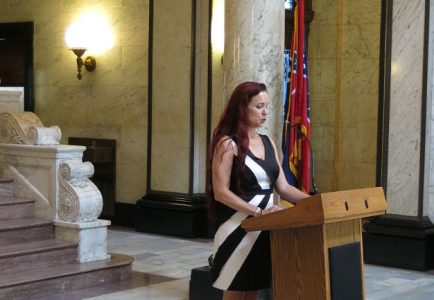
Beth Ann Fennelly speaks at the Mississippi State Capitol, August 10, 2016
Courtesy of the Mississippi Arts Commission News:
Although I was born and raised as a Yankee, I got to the South just as soon as I could, graduate school in 1994. I met my husband, native Alabamian Tom Franklin, on the first day. In 2001, we moved to Mississippi for Tommy, who’s a novelist, to serve as the John and Renée Grisham Writer in Residence at the University of MS, a 9 month appointment. Fifteen years later, we’re still here. We have three born-and-bred Mississippi children, and last year we bought five plots in the Oxford Cemetery, just down the hill from Mr. Faulkner and a beer can’s throw from Barry Hannah, so I think it’s fair to say MS is my home, my geographic and spiritual home, and I am thrilled to be chosen to serve this home I love through the transformative power of poetry.
Poetry can be a bit of a hard sell sometimes. At the Univ. of MS, where I’m a professor of English, I sometimes chat with parents worried that their children won’t leave my Creative Writing class with a “marketable skill.” Perhaps these parents have heard the old joke:
Q. What’s the difference between an English major and a park bench?
A. A park bench can support a family of four.
Well, maybe my students won’t emerge with a marketable skill–unless one considers the command of written and spoken communication marketable, unless one considers stocking the brain with powerful images marketable. I can’t help but proselytize to my students, their parents, and anyone else who will listen because I’m convinced that reading and writing creatively are practices that improve our lives, that expand us spiritually. I’ll offer three reasons.
First, literature educates the emotions, for while we think our emotions are perfectly accessible, transparent, and straightforward, that’s very rarely the case. It’s hard work to know what we’re feeling. Literature develops our emotional intelligence and prepares us imaginatively to comprehend and master life’s events. In the same way that, through nightmares, we rehearse our anxieties, through reading we entertain choices and perceive consequences. We’re able to ask the big questions, like who we are and what we’re doing here on earth.
Second, literature deepens our thinking, not because it provides answers but because it slows our rhythms and clears space for reflection. The world does not encourage reflection. The world encourages consumption. The world rewards speed. As we’ve learned to rely more and more on near-instantaneous technology, we’ve grown less comfortable with reflection, and less skilled at it, and we welcome excuses to avoid it. But we need reflection in order to observe clearly, which is a moral obligation, for only when we see clearly can we think clearly, and only when we think clearly can we speak and write clearly, and only when we speak and write clearly can we effect political change. This is why I agree with Richard Wright when he says, “All literature is protest literature.”
The third thing literature does is teach us empathy through enlarging our experience. A recent study confirms that readers are more empathetic people; for example, readers are better able to guess someone’s emotions by looking at a cropped photo showing only the subject’s eyes. The researchers theorized that reading allows us to practice taking another person’s perspective and therefore improves social awareness. It seems to me that our nation has never been more in need of the empathy that arises taking another’s perspective. Learning to imagine someone else’s story and feelings could be a huge step towards combatting the intolerance, fundamentalism, and violence that compromise our greatness.
As poet laureate, my mission will be to get poetry in front of as many Mississippians as possible. When invited to schools, libraries, and festivals, I’ll receive deep pleasure sharing poems written in Mississippi, about Mississippi, for Mississippians. I’ll collaborate with MS artists and musicians and encourage others to experience the magic of cross-genre inspiration. I’ll facilitate workshops and classes that encourage participants to find and feed their inner poet. And I’ll pursue my mission of wedging poetry into the hands of our young people. For many years I’ve worked with our state’s Poetry Out Loud Initiative which encourages high school students to memorize and recite poetry, and I’ll seek to recruit even more MS high schools to partipate. Finally, I’m honored to be an inaugural member of the Board of Advisors of the MS Book Festival, which truly is an amazing state-wide, inclusive, free, and welcoming celebration of the best writers from our state and the whole country. I’m sad to miss it this Aug. 20 but my family will be in Germany as part of a long-ago arranged sabbatical for my husband to enjoy a fellowship at the American Academy in Berlin. Trust me that I’ll be the first one through the doors next year, and not just because the swag bag had a tiny bottle of whisky.
There’s nothing sweeter than choosing a home that chooses you back. Being selected as poet laureate is one of the sweetest pleasures of my life. Thank you, Gov. Phil Bryant, for this amazing honor; thank you, members of the Poet Laureate panel; thank you, Mississippi Arts Commission, especially Malcolm White, Executive Director, Diane Williams, Director of Grants, and Melia Dicker, Communications Director. Thank you Holly Lange, Executive Director of the MS Book Festival, who will take the podium next to wrap up for us today. And thanks, Mom.
And, finally, thank you, Mississippi. I will strive to be the poet you deserve.
For interview and appearance requests, please contact mspoetlaureate@att.net.